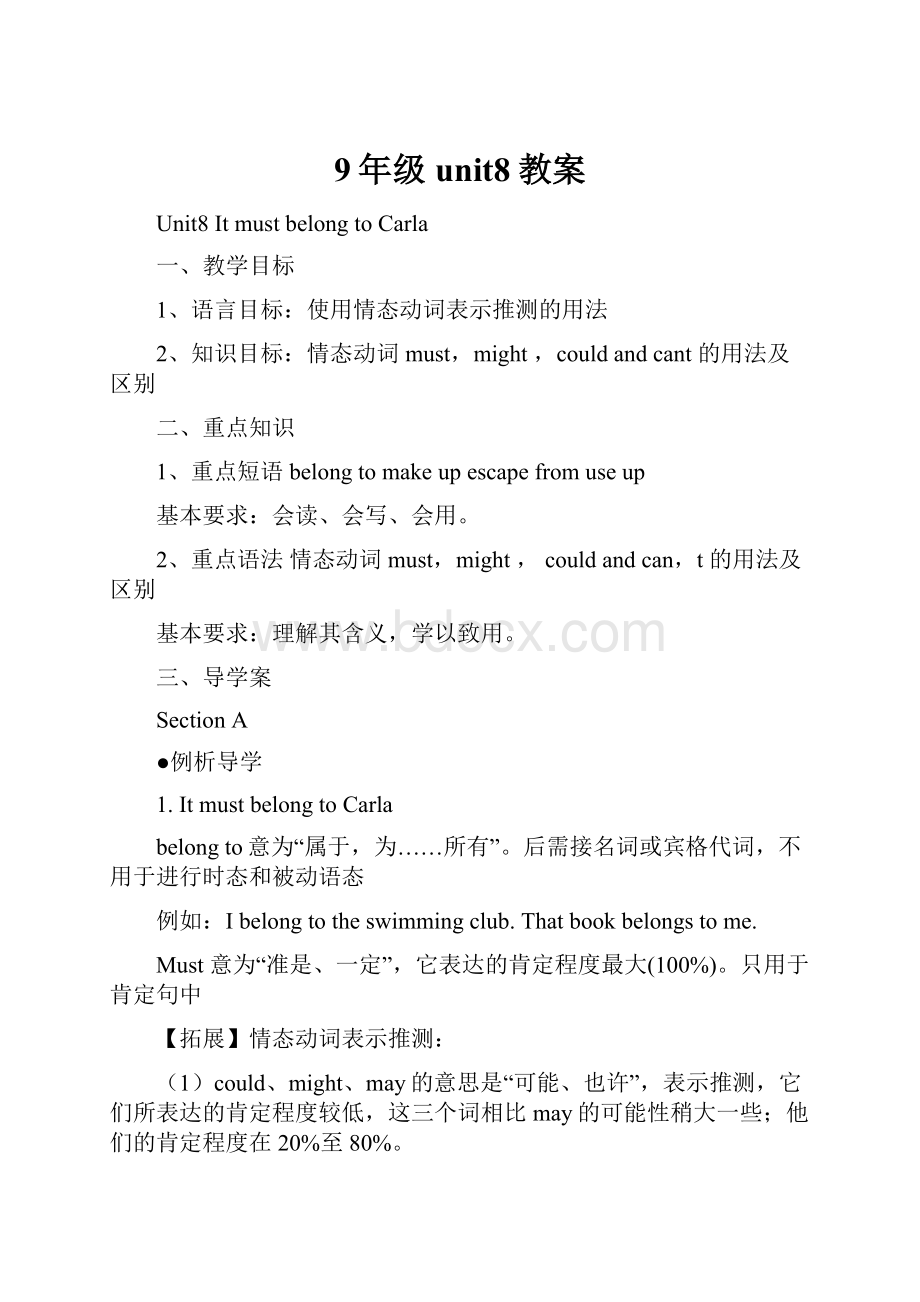9年级unit8教案.docx
《9年级unit8教案.docx》由会员分享,可在线阅读,更多相关《9年级unit8教案.docx(32页珍藏版)》请在冰豆网上搜索。

9年级unit8教案
Unit8ItmustbelongtoCarla
一、教学目标
1、语言目标:
使用情态动词表示推测的用法
2、知识目标:
情态动词must,might,couldandcant的用法及区别
二、重点知识
1、重点短语belongtomakeupescapefromuseup
基本要求:
会读、会写、会用。
2、重点语法情态动词must,might,couldandcan,t的用法及区别
基本要求:
理解其含义,学以致用。
三、导学案
SectionA
●例析导学
1.ItmustbelongtoCarla
belongto意为“属于,为……所有”。
后需接名词或宾格代词,不用于进行时态和被动语态
例如:
Ibelongtotheswimmingclub.Thatbookbelongstome.
Must意为“准是、一定”,它表达的肯定程度最大(100%)。
只用于肯定句中
【拓展】情态动词表示推测:
(1)could、might、may的意思是“可能、也许”,表示推测,它们所表达的肯定程度较低,这三个词相比may的可能性稍大一些;他们的肯定程度在20%至80%。
(2)can’t的意思之“不可能”,它相应的肯定形式是must;它的可能性为0%。
(3)must、could、might和can’t的后面可用一般现在时、现在进行时,表示对现在的动作、状态或正在进行的动作的推测。
例如:
Hemight/couldbeplayingbasketballnow.
I’msurethatshecan’tstayathome.
Hemustbewalkinginthegarden.
2.Hewastheonlylittlekidatthepicnic
only作形容词,意为“唯一的,仅有的”可用来修饰名词.
例如:
Heistheonlyboyinhisfamily.
【拓展】only作副词,意为“只,仅,才”修饰主语时,only常置于主语之前
例如:
Onlyadoctorcandothat.
修饰主语以外的成分时,only常置于行为动词之前,be动词,情态动词,助动词后.例如:
Ionlytouchedit.
要确定所修饰的事物时,则置于所修饰的词和短语之前.
例如:
Ihadonly20pence.
3.Use“might”or“could”toshowthatyouthinksomethingispossilytrue.
possily作副词意为“可能地,也许”
例如:
.Possilyhewastellingthetruth.
【拓展】possily与cancould连用以加强语气。
(1)、用于肯定句…意为“设法,尽心竭力地”
例如:
Pleasewritetousassoonasyoupossilycan.
(2)、用于否定句…意为“无论如何也(不能)”
例如:
Icantpossilydrinkanymore.…
(3)用于疑问句…意为“(能否)设法,到底,究竟”
例如:
CouldyoupossilytakecareofmydogwhileImaway?
4.IthinkIdroppeditduringtheconcert……
dropvt.(及物动词)意为“(有意或无意)让掉下来、投下;放弃、不再干”
例如:
Hedroppeditintothemail-box.
【拓展】
(1)vi.(不及物动词)意思是掉下、落下;下降、降低(可与fall互换),
例:
Themandroppedfromthetopofthebuilding.
(2) n.(可数)滴、点滴, afewdropsofrain几滴雨
5.Itriedtocallyoubutyoursaid……
try作动词意为“试图,企图”
trytodo表示“竭尽全力去做……”,强调付出了一定的努力。
例如:
Itriedtolookformylostpen,butIfailed。
trydoing表示“尝试/试图做……”强调只是试一试,不一定付出了努力。
例如:
Itriedchattingwithhim。
Luckily,hewasonline。
相关短语:
tryone‘sbesttodosth.“竭尽全力做某事”
6.Istudyforitbecauseitcounts30%tothefinalexam.
Count作动词意为“以……计算,算作……”
【拓展】Count作动词意为“数”
例如:
About30studentscometotheEnglishcorner,notcountingEnglishteachers.
7、Itmightmeanworried
worried为形容词,常用词组为be/getworriedaboutsb。
/sth,表示“担心某人或某事”,
例如:
IcouldnotsleepwellbecauseIwasworriedaboutmyEnglishtest。
【拓展】worry为动词,常用词组为worryabout,表示“担心”
例如:
IcouldnotsleepwellbecauseIworriedaboutmyEnglishtest。
1、Itmightbelong________Alice.
A.at B.on C.to D.in
2、Thefootballmay______John.
A.be B.belongsto C.belong D.belongto
3、Thisshirt_______beLiLei’s.Itistoobigforhim.
A.can’t B.must C.could D.might
4、He_____beinthegarden.Hemustbeintheroom.
A.can’t B.mustn’t C.should D.maynot
5、Thisbook______Tom’sfather’s,becausehisnameIsonthebook.
A.maybe B.maybe C.mustbe D.must
6、Pleasetry______EnglishifyouwanttolearnEnglishwell.
A.practise B.topractise C.practicing D.practices
7、Jennyis___________aboutthemathtestoftomorrow.
A.worried B.worrying C.worry D.worries
8、Whatdoyouthink“anxious”______?
A.mean B.means C.meaning D.meant
●句析导学
1.Ifyouhaveanyideawhereitmightbe,pleasecallme.
Ifyouhaveanyidea...=Ifyouknow...意为“如果你知道……”。
any用于if引导的条件从句中,有“若干的,有多少”的意思。
例如:
IfyouhaveanytimeI’dliketotalkwithyou.
2、It’scrucialthatIstudyforitbecauseitcounts30%tothefinalexam.
这是It+be+形容词+that从句结构:
常用that从句作主语的句子有下列几个句型:
Itisclearthathewastellingthetruth.
【拓展】1)It+be+名词词组+that从句:
例如:
It’sapitythatyoucan’tgowithus.
2)It+及物动词+宾语+that从句:
例如:
Itworriedherabitthatherhairwasturninggrey.
3)It+be+过去分词+that从句:
例如:
Itissaidthathehasbeentheremanytimes.
4)It+seem/happen/appear等不及物动词+that从句:
例如:
Itseemsthathehaslostsomething.
3、Whatdoyouthink“anxious”means?
你认为“anxious”是什么意思?
Whatdoyouthink用来询问对方的观点或看法等,意为:
你说呢?
你认为呢?
你怎么看?
【拓展】用来询问对方的安排或建议,意为:
有什么事?
你有何安排?
例如:
1)A:
Areyoufreetomorrow?
B:
Ithinkso.Whatdoyouthink?
2)A:
WhatareyougoingtodoonSunday?
B:
I’venoidea.Whatdoyouthink?
专项训练:
1、选择填空:
MissWu:
CanIhelpyou?
LiGang:
Yes,I'dliketoreturnthisbook,please.
MissWu:
(1).___
LiGang:
No,Icouldn'treadit.Ihadahardtimereadingafewpages,
andthenIdecidedtogiveup.
MissWu:
(2).___
LiGang:
Itwasn'tthelanguage.Itwasthewords.Theyaretoosmallforme.
MissWu:
(3).___WhatcanIdoforyouthen?
LiGang:
Well,I'dbegladifyoucouldfindmeanotherbook.
MissWu:
(4).___
LiGang:
Yes,butonewithbiggerwords.
MissWu:
(5).___
LiGang:
Oh,OliverTwist.Thisoneisfine.Andthewordsaremuchbigger.
Thankyouverymuch.
MissWu:
You'rewelcome.
A.Whataboutthisone?
B.Youcan'tkeepthebookforlong.
C.AnotherEnglishstorybook?
D.Isn'titinteresting?
E.Oh?
ButIknowyouaregoodatEnglish.
F.Didyouenjoythebook?
G.Yes,theyarereallysmall.
2、根据提示完成下列对话
T:
Jack,isthisyournotebook?
Jack:
___1___.Mineishere.
T:
___2___?
Lily,doyouknow?
Lily:
It___3___ Mary.Hernotebooklookslikethat.
T:
No,it__4____.Hersisonthedesk.
N:
___5___.Kenlookedforhisnotebookeverywherejustnow.
T:
Ken, ___6___
K:
Oh,yes.Thankyouverymuch.
ExercisesforUnit8SectionA
一、1.这张CD一定是李明的。
ThisCD LiMing’s.
2.这些杂志可能属于她/他。
Thesemagazinesmay/ / to / .
3.这是谁的笔记本?
一定是宁的,上面有她的名字。
_______ notebookisthis
It _______ Ning’s.Ithashername _______ it.
4.他们俩都踢足球,是吗?
They_______ soccer, _______ they?
5.这双鞋对我来说太小了。
Thepairofshoesare______ small_______ me.
6.因为大雨,她迟到了。
Shewaslate_______ itrained .
Shewaslate _______ theheavyrain.
7.我刚才试图给你打电话。
I_______ youjustnow.
8.我们都尽力学好英语。
Weall_______ best _______ Englishwell.
二、选择题:
( )1.----Whatisbehindthattree?
-----Theremustbeadog_______besideit.
A.sit B.sat C.tosit D.sitting
( )2.Thisshirt_______beLiLei’s.Itistoobigforhim.
A.can’t B.must C.could D.might
( )3.He_____beinthegarden.Hemustbeintheroom.
A.can’t B.mustn’t C.should D.maynot
( )4.Jackis_______honestboy. A.a B.an C.the D./
( )5._______peoplewerekilledintheaccident.
A.Hundred B.Hundredsof C.Hundreds D.Hundredof
( )6.----MustIfinishtheworktoday?
-----No,you__________.
A.mustn’t B.needn’t C.can’t D.maynot
( )7.----MayIgoswimmingnow?
----No,you_______.Youmustfinishyourhomeworkfirst.
A.mustn’t B.needn’t C.can’t D.maynot
( )8.Itmightbelong______Alice.A.atB.onC.to D.in
( )9.Thisbook___Tom’sfather’s,becausehisnameIsonthebook.
A.maybe B.maybe C.mustbe D.must
( )10.WhodoesthisT-shirtbelong______?
A.in B.onC.toD.of
( )11.Todayitis____hot,butwestillhave_____worktodo.
A.much,manyB.muchtoo,toomuch C.toomuch,muchtoo
(12.Ididn’tcometoschoolyesterday__Ihadtolookaftermygrandmaathome.
A.becauseB.becauseof C.so D.but
( )13.Wewerelateforclassyesterdaymorning___therainweather.
A.because B.becauseof C.so D.but
( )14.Jennyis_______aboutthemathtestoftomorrow.
A.worried B.worrying C.worry D.worries
( )15.Pleasetry______EnglishifyouwanttolearnEnglishwell.
A.practice B.topractice C.practicing D.practices
●词语辨析
1、can和could的区别和用法
can表示体力和脑力方面的能力,或根据客观条件能做某种动作的“能力”。
例如:
Canyoumakeacake?
can用在否定句和疑问句中时有时表示说话人的“猜测”或“不肯定”。
例如:
Canthenewsbetrue?
(在日常会话中,can可代替may表示“允许”,may比较正式)
could是can的过去式,表示过去有过的能力和可能性,还有怀疑和不肯定的意思
(在否定和疑问句中)。
例如:
Thedoctorsaidhecouldhelphim.(能力)
Atthattimewethoughtthestorycouldbetrue.(可能性)
could用来提问,是有礼貌的请求Could....Please?
语气较为婉转。
例如:
CouldIspeaktoMr.Smith,please?
2、might也是may的过去式,其用法如下:
may的用法:
a.表示”允许”或”请求”例如:
MayIcomein?
在使用这一用法时需注意:
may表示“允许”的否定形式是mustnot,
意思是“不应该”“不许可”。
例如:
—MayItakethisbookoutofthereading-room?
—No,youmustn't.
b.表示说话人的猜测,认为某一事情”或许”或”可能”发生。
例如:
Hemayknowtheanswer.
c.may用在感叹句中可表示祝愿、愿望。
例如:
Mayyousucceed.(祝你成功。
)
might的用法:
a.might可以代替may,表示现在时间的动作,但语气较为婉转客气或更加不肯定。
例如:
Hemightnotcometoday.
b.might用来表示现在时间时,还可表示”规劝”。
例如:
YoumightpaymoreattentiontospokenEnglish.
3、must与haveto的区别
haveto比较强调客观需要,must着重说明主观看法。
另外haveto能用于更多时态,比较下面的句子:
Wehadtobethereatten有时两者都可以用,意思差别不大。
例如:
Wemusthavetoleavenow
must在表示说话人对事物的推测时候要注意它比may肯定得多,相当于汉语的
“一定”或“准是”。
(只有在肯定句中能这样用。
)
Theremustbeamistake.
在回答由must引起的问题时,如果是否定的答复,不能用mustn't,而需要用needn't或don'thaveto,因为mustn't是“一定不要”的意思。
例如:
—Mustwehandinourexercisestoday?
—No,youneedn't.
mustnot的否定形式则表示“不应该”或‘不许可”,语气比较强烈。
例如:
Youmustn'tplayontheroad.
情态动词can、may、must表示语气和情态,人称与数无变化,动词原形跟着它。
情态动词两要点:
动词原形跟后面,说话语气较委婉。
can表“能力”,may表“许可”,must表“责任”或“义务”,否定回答needn't换,"需要”need,dare“敢”。
should“应该”,would“愿”,haveto“被迫”表客观。
may(might)与must:
否定may用mustn't,否定must用needn't。
祝愿句中只用may,把握不大用might。
need的用法:
实义动词表"需要“,后接名、代和不定式。
need后面接动名词,主动形式表被动。
情态动词表”需要“,没有时态、数、人称。
其后直接跟动词,多用于疑问和否定。
名词need表”需要“,平时也可常用到。
情态动词oughtto与should:
oughtto,should两相通,语气oughtto比较重。
该做没做用完成。
【情态动词易混点归纳】
易混点一:
can和beableto:
两者表示能力时用法相同,但can只有原形“can”和过去式“could”两种形式,在其他时态中要用beableto来表示。
另外beableto常常指经过努力,花费了时间和劳力之后才能做到某事。
如:
Jimcan’t